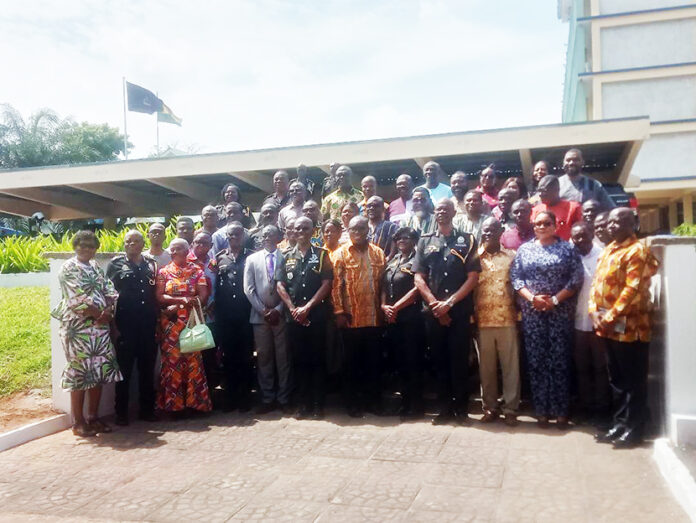The Trade Union Congress (TUC) has suggested to the Ghana Police Service to liaise with the relevant city authorities to create a car park outside the business district of Accra for individuals to park their cars and then join public transport to the central business district.
This, according to the TUC, will help to ease traffic in the business district of Accra before and during this year’s yuletide.
Anthony Yaw Baah, Secretary General of TUC, who spoke on behalf of his outfit, during a meeting with the police management board in Accra, on Wednesday, this week, also suggested that Ghana should mimic examples in the advanced countries, where traffic offenders are barred from driving forever.
This, he noted, would ensure discipline on our roads because the drivers know that their licenses could be withdrawn for ever, should they fail to obey traffic rules. The TUC also suggested that government should enhance logistics and welfare of police personnel, whilst the latter should also educate the public on rules governing demonstrations.
They also wanted the police to stop poor policing practices such as extortion.
The TUC leadership thanked the IGP and his team for inviting them to discuss issues of national importance.
Responding to the suggestions and concerns raised by the leadership of the TUC, the Inspector General of Police, Dr George Akuffo-Dampare, said motorists are currently being handled with compassion and encouragement of good behaviour.
He said if these measures fail, all other measures would be deployed to ensure discipline and safety on the road.

On the issue of creating special parking lots outskirt Accra, the police noted that the country currently does not have effective public transportation system and that the implementation of the policy would face some challenges.
He also clarified that the confusion over the difference between ‘Occupy Flag Staff House’ and ‘Occupy Jubilee House’ demonstrations.
According to him, Occupy Flag Staff House occurred in the year 2014, but despite the suggestion of the name, majority of the demonstrators were grouped at the Afua Southerland Children’s Park, while those among them who went on unapproved routes were accosted and prevented at Afrikiko, Cantonments and Kawokodi, and they never made it to the seat of government.
He talked of the distractions that Occupy Jubilee House caused the country in term of vehicular movement, as well as to the 37 Military Hospital.
Meanwhile, the protestors of Occupy Jubilee House took to the streets at a time the matter was before court. Dr Dampare added that the Public Order Act spelt out the “dos and don’ts” of the organisation of demonstrations, which include the organisers notifying the police in writing in five clear days, after which the law enforcement officers will respond and the organisers would reply within 48 hours.
He continued that the organisers are to give details of the type of special events they are embarking upon, date, venue, starting time and location as well as termination point.
The police will, therefore, rely on the court if the organisers refused to accept changes to their original plan after it has been established that it may have effect on defence, public health and order, infringement on rights or prevent the delivery of essential services.
“We know that in the past we have not been engaging and that had created a situation where were not understanding ourselves and when that happens, people also took advantage of it because were not on the same page. We have learnt our lesson for God and country,” he said.
He further told the TUC leadership that the police was soliciting their opinions to improve security during the festive season.
The Director-General of National Patrols, Commissioner of Police (COP) Paul Manly Awuni added that the police administration no longer go to court for exparte motions.
“Currently, we actually go to court on notice and the organisers are also given a chance to come to court to make their case,” he explained.
He explained that the police are compelled to go to court for redress when organisers of special events fail to comply with the Public Order Act.
COP Awuni further stated that the police were currently not a brutal force and that it doesn’t deploy the use of lethal weapons during demonstrations.










